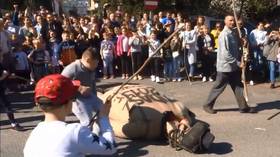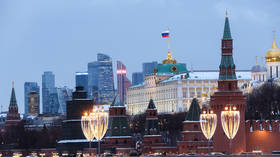Poles BEATING & BURNING long-nosed effigy of Judas sparks fury of Jewish group (VIDEO)

The World Jewish Congress has condemned as anti-Semitic a tradition upheld by a small Polish town, which involves beating and burning an effigy of Judas Iscariot, the betrayer of Jesus Christ.
A video showing this year’s celebration of a dubious local tradition in Poland was published by a local news website ekspresjaroslawski.pl and drew international attention. The World Jewish Congress has condemned it in a statement on Sunday.
“Jews are deeply disturbed by this ghastly revival of medieval anti-Semitism that led to unimaginable violence and suffering,” CEO Robert Singer said. “We can only hope that the Church and other institutions will do their best to overcome these frightful prejudices which are a blot on Poland’s good name.”
The peculiar rite of “judaszki” or “trial of Judas” is kept by the town of Pruchnik in southeastern Poland, which has a population of about 3,500. With its roots traced back to at least 18th century, the rite is conducted on Maundy Thursday and Good Friday.
A straw-filled effigy of Judas, which is made as a caricature of a Jewish person with a long nose, is hanged on Thursday next to the local church and stays there overnight. On Friday, a mock trial is held, after which locals drag the effigy along the streets as children run after it and beat it with long sticks representing the 30 silver pieces. The effigy is then cut open and burned down while its remains are thrown into the local Mleczka River.
The tradition used to be honored in other parts of Poland, but the Catholic Church eventually banned it because it tended to trigger anti-Jewish violence, according to a travel guide published by the Polish Tourist Organization. The version held in Pruchnik is the only event which remains.
Folk traditions tinged in anti-Semitism also survive in western parts of neighboring Ukraine, which used to be part of Poland. Traditional nativity scenes there often include a Jewish caricature, usually shown trying to make a profit from the Holy family.
Think your friends would be interested? Share this story!














